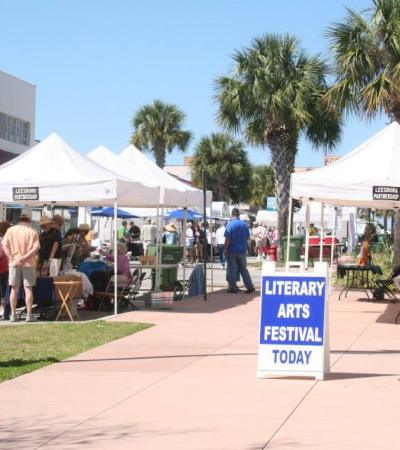Thanks primarily to the Garden Club of St. Augustine, but also to the support of each participating branch library's Friends organization, we have been hosting these workshops for six years in our library system. Garden Club members Cathy (my mother) and Marilyn — a.k.a. "the sisterhood of the traveling plants" — design the workshops, featuring a different pollinator each summer. They then train the other circles in the Garden Club of St. Augustine on how to present the workshops at the branch library in their respective communities.
These workshops are aimed at elementary-aged children and provide opportunities to learn all about the selected pollinator (this year was dragonflies); create a flower arrangement and a craft; and take home gardening goodies such as Nature Detective notebooks, soil, seeds and other donations from local gardening stores. These workshops have won national gardening awards for the Garden Club of St. Augustine, as well.
Advanced Planning
If you are presenting these programs in the summer, I recommend to start planning as early as possible in the year.
Additionally, if the workshops include a limited number of materials and/or are designed for a classroom-type setting, I would recommend doing pre-registration with a specific cap in mind. These events are incredibly popular in our community. We typically host two workshops of 25 kids apiece and usually, there's a waitlist.
The following are further tips on how to go about planning Nature Detective workshops at your library:
- Contact your local garden club to see if they'd be interested in a programming partnership.
- Reserve a few dates in advance for your meeting room. This way, you have different date options for booking your program.
- Determine how much the garden club and your library's Friends organization will contribute.
- Decide on your target audience for the workshops.
- Choose who will present the program (e.g., members of the garden club, your staff, other volunteers) and who will train them.
- Coordinate who will develop the program that will be presented (e.g., the garden club, you or both). Every garden club is unique, as is every community, so Nature Detectives could focus on anything to do with gardening.
Marketing
For marketing this event, we use traditional outreach methods such as fliers, the library's website, social media and press releases to the papers. We also email the elementary school media specialists before school lets out for the summer.
Keeping your library staff appraised is another great promotional strategy so they can promote the workshops by bringing the sign-up sheet and plugging them during other programs for kids.
Folks are looking for fun and educational opportunities in the summer, and this fits the bill! Now that we've been doing them for some time, they have a following.
Budgeting
The programs are primarily funded through the Garden Club of St. Augustine and the library system's Friends organizations. Each branch's friends organization gives $100 for the workshops, while the Garden Club of St. Augustine (the partner organization) donates $400 per branch. This funding goes toward providing all of the materials, giveaways, plants and more for workshop participants to use and take home.
Depending on what you do with your garden club, you could find something that works for you both. You may find that your garden club already has a specific budget for youth outreach. Our garden club has said many times we are the perfect vehicle for reaching a large number of children and families. So, this program presents an excellent partnership opportunity for the garden club.
Day-of-event Activity
On the day of the event, I would suggest setting up as early as you can. This will make it easier when you start letting in families and checking them against your sign-in sheet, since it will let you easily fill any holes with the waitlist folks or walk-ins.
I would also recommend placing the tables into a U shape with no chairs and the open part where the presenters stand. This will really help the kids in the program focus. During our program, beach towels are also laid down inside the U for parts of the program where the kids are able to sit down.
If you are pre-registering, call each attendee the week of the program to confirm they are coming. This will allow you to fill any open spots with people on the waitlist.
For the day of the workshop, utilizing teen library volunteers is a great way to have a few extra hands, especially for help cleaning up and putting away tables and chairs. Our Garden Club Circles usually come with a handful of ladies, too.
In addition to the main workshop, we also partner with the Arts in Motion Club at one of the nearby high schools year-round. They come out and do our craft activity tying into our pollinator. This could be run by one staff person, provided the materials are ready to go.
Program Execution
For the most recent workshops, the featured pollinators were dragonflies. Both of the offered workshops were filled to capacity with all the kids and their caregivers. (We asked caregivers to stay in the room, and they seemed to enjoy the workshops as well!) Though it took a little more effort, the pre-registration really paid off in getting so many families there.
For the program, Cathy, Marilyn and their fellow Las Adelfas Circle ladies showed participants a short video about dragonflies using our projector and a laptop; taught them all about dragonflies as pollinators; gave them their Nature Detective notebooks for observations at home; helped them create a flower arrangement; gave them their gardening goodies; got them up and about with interactive activities; and then sent them to our next meeting room where they worked on a dragonfly craft with the Arts in Motion Club teens.
We received wonderful feedback from participants, and the workshops just get better each year.
Advice
My advice is to be open to partnerships and be flexible! You never know what your local garden club has to offer. You also have a lot to offer them with your meeting room space, youth populations and mutual interest in developing young minds. This is a wonderful community partnership that allows so many to be involved, not least of all the adults in the garden club who get to see what you do and what your library has to offer.
Feel free to contact me (ascrawford (at) sjcfl (dot) us) with any questions or ideas and don't be afraid to reach out to your garden club or any other organization in your community. The worst you could ever receive is a "no."
Supporting Materials
- Feedback (Coming Soon!)
- Programming Librarian Facebook Group




